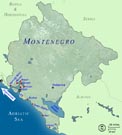Poor services keep rich tourists away from Montenegro
 Budva, Montenegro - Montenegro has ambitious plans to be a holiday destination for Europe and Asia's richest tourists, given the undisputed beauty of its mountains and coastline, but the West Balkan country may have flopped this year through poor services and neglect.
Budva, Montenegro - Montenegro has ambitious plans to be a holiday destination for Europe and Asia's richest tourists, given the undisputed beauty of its mountains and coastline, but the West Balkan country may have flopped this year through poor services and neglect.
A badly laid water main ruptures in Montenegro's top Adriatic resort of Becici, sweeping across much of the sandy beach and irritating visitors by severely muddying the clear blue sea.
To the north, a shadowy entrepreneur apparently protected by the political elite, blasts away hundreds of tons of a seaside hill in the Bay of Kotor to create space for a new hotel and a beach, even though the bay is under UNESCO World Heritage Site protection.
On the southern end of the country's coast, in Ulcinj, local authorities launch a war on mosquitoes. But they simultaneously generate panic by spewing massive amounts of poisonous smoke from cars driving around in broad daylight.
The incidents were reported by Montenegrin media at the height of the tourist season, highlight shortcomings that could harm the young country's ambitious programme of drawing tourists to its coast.
The chronic problems, such as low water pressure in Budva, have long been a talking point among Serbs, many of whom have long spent summer holidays in Montenegro, rather than go through a time- consuming application for Greek visas or spend their earnings on expensive flights to Turkey.
An "all-inclusive" package in Budva means having water all day, runs an old Serbian joke. The joke may soon find its way into Russian and English - if the visitors come.
In recent years the Montenegrin tourist industry has turned to a more affluent clientele - Russian, Arab or European - passing over the Serbs who normally go for the hundreds of thousands of cheap beds in "private accommodation."
Instead of "social" catering, whole villages with luxurious homes for rent or sale and five-star hotels emerged almost overnight along the 300-kilometre coast.
Russian buyers flooded the market, driving prices up sharply.
But the 2008 summer season now drawing to its close fell short of expectations.
While government estimates up to the end of August run to 610,000 tourists, a rise of 7 per cent on the year, and the state tourist organization claims as many as 100,000 visitors in August alone, many in the private sector are muttering about a "disaster."
Despite official figures, the kerbs in the seaside resorts - Budva, Petrovac, Sutomore and elsewhere - are crowded with people waving "free room" cardboards signs.
"The season flopped," a hotelier in Becici said on condition of anonymity. He said there had been a 40-per-cent decline. His colleague said "the high season this summer lasted a whole nine days."
In stark contrast to previous years in Petrovac, there were plenty of free umbrellas and sunbeds even in the row closest to the water. Prices, however, remained as high as 12 euros (18 dollars) for the day.
On the more exclusive beach at the Milocer hotel, a mandatory umbrella with two beds cost 25 euros, plus 10 euros for parking. Many local business people agree that the prices are simply too high.
Montenegrins are unwilling to acknowledge that the steep prices do not offer value for money and that their services are not up to standard.
Tourist do not go on vacation to listen to construction workers hammer away and shout next door, doing up the next door project despite a formal building ban during the high season.
Free-entry beaches, such as the huge and beautiful Buljarice, are littered and dirty. Nylon bags, and sometimes worse, garbage float in the water.
The neglect of the public spaces favoured by those on a low budget causes particular offence because Montenegro bills itself formally as a "green state," charging an
8-euro ecology entry tax on foreign cars. Coaches pay considerably more.
The rising cost of vacationing in Montenegro has discouraged many Serbs, and persistent shortcomings in service standards have driven away pickier tourists, like the Germans.
And the Russians, who have come instead, buying tens of thousands of holiday homes over the past few years, are now more like locals than tourists.
This year, the rumour goes, many either invited family and friends, or rented their properties to compatriots - informally and without declaring the income to the Montenegrin or Russian authorities. (dpa)